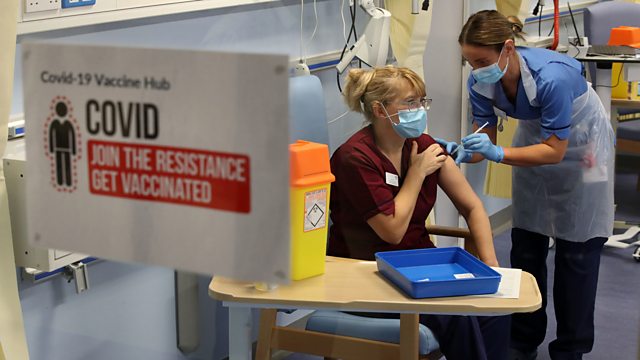
New Covid vaccine
Next-generation of RNA vaccine
Researchers at Imperial College have been working on a strategy that can make RNA vaccines stretch further. Anna Blakely explains how the new approach works and why RNA vaccines are adaptable to a changing disease.
In January 2019 a dam collapsed in Brazil, spilling 10 million cubic metres of red sludge down nearby rivers, claiming the lives of at least 259 people. An engineering report into the collapse looked at data from safety sensors around the site, and said they鈥檇 not revealed any weakening of the dam prior to the failure. But a new study using data from Earth observing satellites has found signs of subtle movement starting weeks earlier. Stephen Grebby of Nottingham University and Roland Pease discuss this finding.
An international collaboration led by Kew Gardens has just set out a list of ten golden rules for maintaining and restoring forests. The main author, Kate Hardwick talks about why the rules are necessary and why it isn鈥檛 as simple as planting any old trees.
There鈥檚 been a lot of debate about whether being bilingual is good for the brain. Does knowing more than one language take up precious capacity that could be used for better things? Or does it sharpen it, all the better to take on more challenges? Dean d鈥橲ouza of Anglia Ruskin University has been addressing this question by comparing the behaviour of infants brought up in monolingual and multilingual homes.
And, When planning to have a baby, women are expected to give up everything from smoking to alcohol, even soft cheese. But the other half of fertility comes from the sperm, usually provided by a man. So should men also give up their vices to improve the quality of their sperm, and their chances of conception?
That鈥檚 what Listener Stuart in Australia wants to know. He emailed CrowdScience after he and his wife had been trying to have a second child for two years. He gave up alcohol, and coffee, but wants to know if there is any hard science to back up the idea that this would improve his fertility.
To find out, presenter Anand Jagatia speaks with Professor Allan Pacey, a scientist who specialises in the study of male fertility and sperm. He discovers that male subfertility accounts for 50% the problems with getting pregnant. And we鈥檙e far from alone. Sperm is a remarkably diverse, but also fragile cell. Across the animal kingdom, different species have problems with male fertility, but have adapted novel ways to improve their chances of reaching the egg.
Men often struggle to speak about their fertility, and reporter Chhavi Sachdev tells Anand the impact this has on couples in India who struggle to conceive, or don鈥檛 want to. She speaks with fertility specialist Professor Nirmal Kumar Lohiya about how this reticence to speak about fertility is changing.
Viruses from Mumps to HIV have long been known to target the delicate sperm production cells in the testicles. Dr Krutika Kuppalli tells Anand why, and what we know about the possible impact of SARS CoV-2 on male fertility.
Professor Allan Pacey gives Anand and Stuart some advice for what to do while trying to conceive - don鈥檛 wear tight underwear - and get used to talking about your swimmers or even getting them checked out.
(Image: Getty Images)
Last on
More episodes
Previous
Broadcasts
- Sun 31 Jan 2021 01:06GMT大象传媒 World Service
- Sun 31 Jan 2021 16:06GMT大象传媒 World Service News Internet
Podcast
-
![]()
Unexpected Elements
The news you know, the science you don't

